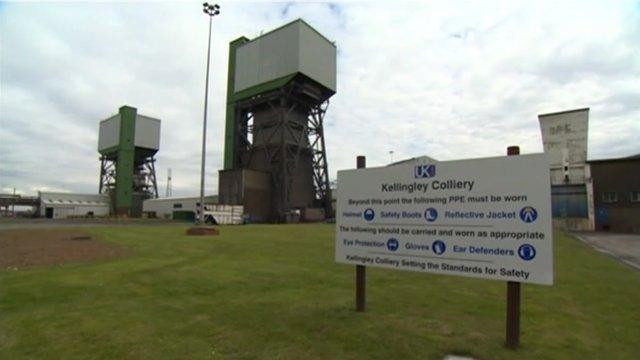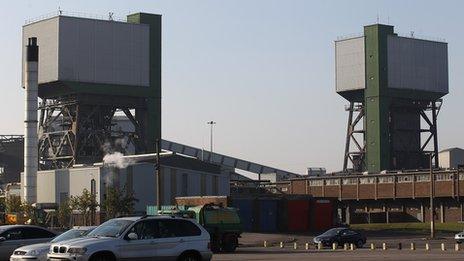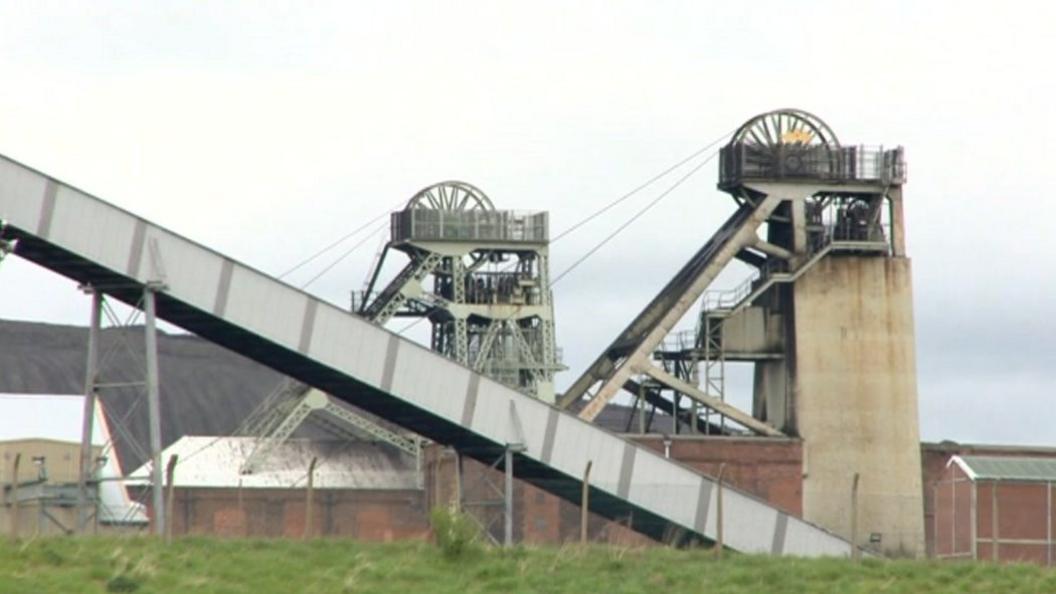Kellingley pit closure marks 'end of era'
- Published

The closure of Kellingley Colliery signals the end of an era for coalmining in the area
Kellingley Colliery is the last remaining deep mine in North Yorkshire, with reserves which have the potential to last until the 2030s, UK Coal has said.
But in the face of a financial crisis, its owners UK Coal are poised to shut the shafts at the pit for good.
Its closure, which will be phased as a result of a £10m government grant, will see the operation wound down over 18 months with the loss of 700 jobs, the National Union of Mineworkers said.
The immediate impact will undoubtedly be felt most by the colliery's workers and the closure itself signals the end of a once proud legacy for those living in the area which is on the border between North and West Yorkshire.
The Five Towns - Knottingley, Featherstone, Pontefract, Castleford and Normanton - are steeped in mining heritage, with generations of residents having worked in its pits.
Graham Isherwood, who worked at Ackton Hall Colliery in Featherstone for 10 years and is now a ward councillor, said: "My dad worked there, my granddad worked there.
"When we did our family tree we didn't find one male who hadn't worked in the pits, going back to the 1800s."
The towns boasted several collieries in the industry's heyday and at its height Kellingley employed more than 2,500 people.
Mr Isherwood added: "Without mining there wouldn't be the Five Towns. All the towns around here sprung up around mining.
"It's tragic to even start thinking about the last pit being shut down."
Following privatisation three decades ago, the towns were hit hard, with many miners losing their jobs and struggling to find work again.

Knottingley, Featherstone, Pontefract, Castleford and Normanton - are steeped in mining heritage
It's a fear that threatens to repeat itself today.
Victor Waddlow, who has worked at Kellingley for the past decade, said: "I'm 53-years-old with 35 years of mining [experience].
"Where do I go? I'm going to be chasing jobs against lads who are 16 to 20 years old. Who are they going to pick?
"It's going to be hard. It's going to be hard for a lot of men at Kellingley because it's quite an old workforce."
UK Coal announced in March it needed £10m to prevent the immediate closure of its last two deep remaining mines; Kellingley and Thoresby in Nottinghamshire.
Andrew Mackintosh, from the company, blamed its financial problems on falling global coal prices on top of a fire which destroyed, and subsequently closed, its Daw Mill Colliery in Warwickshire.
The firm has since been working with energy minister Michael Fallon and trade unions to raise millions of pounds to help stagger the closure of its pits.
'End of an era'
Tony Lodge, an economist from the Centre for Policy Studies think tank, said the next 18 months gave managers the opportunity to find a buyer for the pit.
He said: "The real opportunity for Kellingley is to for it to be able to look at the issues of the next 18 months - for it to examine future investment, future potential buyers who are interested in a long term future, and ultimately working with the miners.
"If we go down a route where it's just asset stripping, then the mine and the coal reserve will be lost."
Hundreds of jobs at Kellingley hang in the balance as UK Coal fights for its future - an irony when the company said last year the coalfield had about 60m tonnes of reserves.
If the company's two sites close, it would leave employee-owned Hatfield colliery in South Yorkshire as the UK's last remaining deep pit mine.
But for many, the closure is the final blow to an industry which, on Kellingley's doorstep, was already bruised.
Keith Hartshorne, who has worked at the pit for 26 years, said: "It's the end of an era and the industry as we know it, if it were to come about.
"It's a very sad time."
- Published4 April 2014

- Published2 April 2014

- Published29 March 2014
